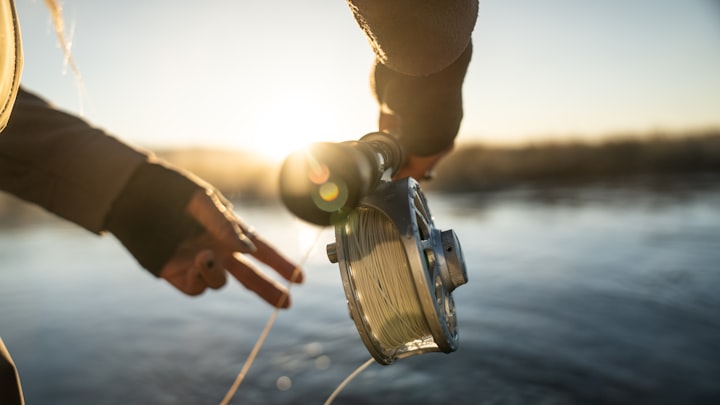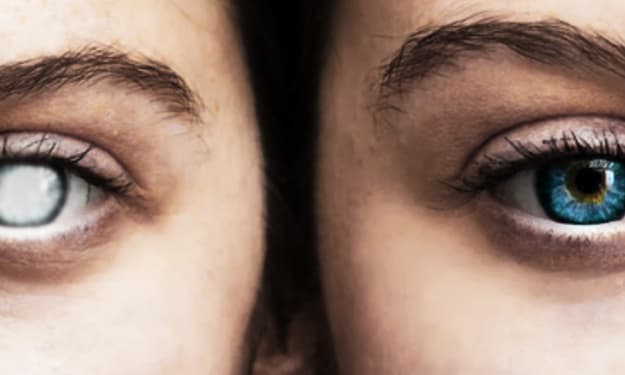Tiny Scars & Bright Blue Eyes
On any random day, at any random time, any random person could walk into your life and change it forever.

My whole life, all eight years of it, was packed up into a moving truck and ready to leave home. I was not. I stood next to the massive trailer and Elijah, my next door neighbor and best friend, stood in front of me. Our parents were saying goodbye—of course they would call, and we would come visit—but Elijah and I both refused to say that horrible, terrible word. Instead he put his arms around me, without taking the one step it would have taken to close the gap between us, and I put my arms around him, and we stood there leaning on each other for a long time.
I never saw Elijah cry. When he was upset, his face would just crumple. The space between his eyebrows shortened by about half, his mouth turned down at the corners, and his eyelids looked as if they had weights attached to them, barely open enough for me to see his bright blue eyes. When he was really sad, his chin would tremble slightly. His chin was trembling that day.
On impulse, I handed him the small stuffed dog I had been clutching. It was old and limp, and some of the stuffing was missing from the time my real dog got to it, but Elijah accepted it. He, in turn, reached into his pocket and handed me his favorite Hot Wheels car, the faded blue one with the purple stripes and the missing wheel, and I cradled it in my hands like it was the most fragile and valuable thing in the world.
It still sits on the bookshelf in my bedroom.
Once I was buckled into my seat in our car, I contorted my body as far as I could to look out the back window at my friend. He was waving, the little stuffed dog flapping in the air and his backside wagging back and forth slightly. But I didn’t wave. I was too busy wiping the tears from my eyes. I stared out the back window at my friend until he was as tiny as the ants we used to watch together. We were always so impressed at how they could follow each other in such straight lines and carry things that were so much bigger than they were.
It was the last time I would see him, and although I didn’t really know that at the time, I cried like I did.
My parents tried to get my mind off of the move by playing my favorite music. At the time it was Michael Bolton. They were no doubt hoping I’d fall asleep to the sound of his crooning as we left Miami, but I stayed awake for every minute of the longest four-hour car ride of my life, listening to my little sister snoring quietly beside me. She was only three, not old enough to realize what we were leaving behind.
When we pulled into the driveway of our new house in tiny Mount Dora, I was impressed, in a way that only children can be, to see a tire swing hanging from one of the eight oak trees in the front yard. I told myself that I would never let my parents see that I approved of a single thing in this new house, but I made a mental note to come out and swing later.
The rest of the house was less than impressive. The backyard was just dirt and a single struggling rose bush, the inside of the house still smelled like the old lady who had just moved out, and my bedroom, to my shock, didn’t even have a bed in it yet. It was just four white walls and a creaky wooden floor.
I collapsed onto that dusty wood floor, snow-angel style, and stared at the ceiling, wondering how long it would take me to walk back to Miami if I decided to run away.
Salvation came in the form of our 93-year-old neighbor. Mr. Ronnie Allee knocked on our door barely an hour after we arrived. He tipped his tattered baseball cap at my dad and set a huge ‘welcome to the neighborhood’ watermelon on the kitchen counter in front of my mom. At the time I thought that watermelon was way too big for a man his age to be carrying, but I soon learned that the number 93 meant nothing to my neighbor. In fact, five years later I would catch him climbing a ladder to sweep the leaves off of his roof.
He asked if he could take us fishing on the lake after we’d unpacked. My parents, ever polite, told him that we’d love to go fishing with him sometime after we were all moved in. I, however, decided that if I was going to run away, fishing with him would perhaps be the perfect opportunity. I begged my parents to let me go right then, and my mom finally opted to take a break from unpacking and sit on Mr. Allee’s dock to watch while he and I fished from his boat out on the water.
She waved at me every time I glanced in her direction. At the time I thought she was trying to say, “I’m still here, still watching, ready to catch you if you try to wander off.” Looking back, she probably just didn’t want to leave me alone with a old man we just met.
As he taught me how to cast the hook out into the water and reel it back in slowly, my thoughts wandered back to the time, not a week before, when Elijah and I sat on the top bunk of his bed and used a plastic toy fishing pole to fish for Beanie Babies from the bunk below. On the rare occasions when we were actually able to catch a Beanie Baby, Elijah’s whole face would light up, his smile wide enough for me to see every one of his crooked teeth, and hold up the toy like Rafiki held Simba in The Lion King.
The thrill of successfully hooking a small stuffed animal on a toy pole was much different from the near-terror I felt when I hooked a real fish. I felt the vibration when something—in my head it was some kind of monster, not a fish—nibbled on the hook. When the bobber disappeared under the water, I nearly dropped the fishing pole, but Mr. Allee put his strong, bony hands over mine and steadied it. I noticed all the tiny scars on his hands and fingers, which I later learned were from years of baiting hooks and repairing his dock.
He yanked the line to set the hook and helped me reel in the fish, which was at least as panicked as I was. I screamed as it flopped around my feet. Mr. Allee laughed, his wide smile revealing his teeth, yellowed and unbelievably straight. He unhooked the fish and stuck his fingers in its gills to show me what I’d caught.
“Would ya look at that,” he said. “Not bad for a rookie.”
I did not know what a rookie was, but I felt mildly insulted.
After the initial trauma wore off, I allowed myself to touch the slimy scales and rough fins—but not before pulling back a few times, certain that it was going to jump up and bite my hand clean off.
“Why isn’t he blinking?” I asked.
“He just can’t believe how funny lookin’ I am,” he said.
I looked him over and decided that I disagreed with the fish. Mr. Allee was not funny looking. He was old, but his bright blue eyes still twinkled like stars. I would not realize it until years later, but those eyes, wide and mischievous, reminded me so of Elijah.
I thought he was gone, but there he was in the eyes of my new neighbor.
Mr. Allee tossed the fish back into the water and grabbed the back of my life vest as I leaned too far over the side of the boat to watch it swim away. After a few more successful casts—at my insistence, Mr. Allee threw every single fish he caught back into the water—Mr. Allee docked the boat and I jumped into my mom’s arms. I decided I wouldn’t run away that day after all.
“Next time I’ll show you how to clean ‘em,” he said.
Of course, I would later be horrified when I found out what cleaning a fish entailed. One day after a fishing trip, without warning me first, he would slap a fish onto a wood block outside his house and bring his hatchet down on its head. From then on, every time we got off his boat after a day of fishing, he would try to hand me the hatchet, I would refuse to even touch it, and he would laugh.
My mom began walking home with me slumped in her arms, exhausted after the most emotionally taxing day of my eight-year-old life. I waved goodbye to Mr. Allee from over her shoulder, and he tipped his hat again and disappeared inside his house, the house that would soon become my second home.
I would learn to play Skip-Bo in that house, with Mr. Allee and his wife, Anna May. My whole family, even our cat, would take refuge there during the hurricanes of 2005. We would watch the massive pine tree across the street fall and take the power lines with it. Mr. Allee would beat me at Skip-Bo, even with the gale rattling his windows, even by candlelight.
When we got back home, my dad was inside blowing up an air mattress for me to sleep on that night. It made noise every time I moved, and it took me a long time to fall asleep, but when I woke up the next morning, my room had my bed in it. In fact, it had my lamp and my dresser and my Spongebob stereo in it as well.
I made my way through the rest of the house, seeing my dad’s paintings on the walls and our ugly abstract rug in the office. I saw my favorite red grasshopper chair, complete with spit-up stain, sitting in the living room. As I approached it from behind, I saw the familiar tattered baseball cap. Mr. Allee was sitting there, chatting with my parents, who were sitting on the leather couch that my grandpa had upholstered.
“Mornin’,” Mr. Allee said as I climbed onto my mom’s lap. My dad brushed my messy hair out of my face.
“That’s mine,” I said, pointing to the spit-up stain visible just above Mr. Allee’s right shoulder. I was not joking, but they all laughed.
Mr. Allee had come to help my parents move the rest of our furniture into the house while I was still sleeping. Mrs. Allee was in the kitchen making iced tea with honey, her specialty. My mom let me have a sip of hers, but would not let me have my own glass because it had too much sugar and caffeine. I did not know what caffeine was, but I wanted some anyway.
“I’ll have Anna May make some more next time we go fishing,” he said, winking at me. “It’ll be our secret.”
Mr. Allee could not jump rope with me or race me in the swimming pool like Elijah could, but he seemed impressed when I showed him how the ants in my front yard walked in straight lines and carried things that were bigger than they were. He played cards with me like Elijah did, although Skip-Bo was harder than Uno.
Last Thanksgiving, we went to Miami to visit our family and drove past our old house. It had been torn down, and a bigger house was being built in its place. A house without the mosaic front steps my dad made, each tile painstakingly placed. A house without the boulder we sat on to take Christmas card pictures every year, without the crooked knocker on the front door, and without the handprints I made when I accidentally touched the freshly painted walls. Elijah’s house still looked the same, except for the “for sale” sign planted in the front yard. I wondered for a moment what Elijah was up to, how many people had lived in that house since we left. My dad shook his head as we drove away, and my mom took off her glasses so she could wipe tears from her eyes.
To my surprise, I wasn’t upset about our old house. It had been erased, along with any trace that my family had ever lived there, but it wasn’t what was gone that upset me. It was what was never there in the first place.
The man who baptized both me and my father at his dock. The man who set off fireworks from the lake every year, even when it made his wife nervous, even when my dad offered to do it instead. The man who took me fishing every weekend until the weekend he passed away, at 98 years old. The man with scarred hands and bright blue eyes.
About the Creator
Jessica Gonzalez
Screenwriter & YA Fantasy author of angry girls and beautiful monsters






Comments
There are no comments for this story
Be the first to respond and start the conversation.